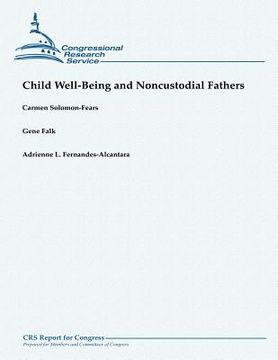Synopsis "Child Well-Being and Noncustodial Fathers (in English)"
The structure of a family plays an important role in children's well-being. A contributing factor to the high rates of child poverty over the long-term, and the increase in child poverty during the period from 2001-2007, was the increasing likelihood of children living in families headed by a single female. In 2012, about one-third of all children lived in families without their biological father present. According to some estimates, about 50% of children (who are currently under age 18) will spend or have spent a significant portion of their childhood in a home without their biological father. In 2011, the poverty rate for children living in female-headed families (usually headed by a single mother) was 48%, compared to 11% for children living in married-couple families. Policies enacted in the mid-1990s focused on moving single mothers from the welfare rolls to work; with these policies in place and the economic expansion of the late 1990s, child poverty rates fell. However, these gains in the economic well-being of children were limited and temporary, as child poverty increased again in the 2000s, even before the onset of the recession that spanned from December 2007 to June 2009. An option to improve the well-being of children living in single-mother families is to seek greater financial and social contributions from fathers, particularly noncustodial fathers. However, the ability of noncustodial fathers to support their children has been complicated by certain economic and social trends. Over the past three decades, changes in the labor market have led to less employment and lower typical wages for men. The wages of men with lower levels of educational attainment have fallen since the mid-1970s. Criminal justice policies have changed, leading to increases in the rate of incarceration of men. These trends, while affecting all racial and ethnic groups, had a disproportionate impact on African American men. The most recent recession has hit men's employment hard; and it has hit employment of young, African American men particularly hard. Although social science research and analysis acknowledge a father's influence on the overall well-being of his children, federal welfare programs have to a large extent minimized or underplayed the role of fathers in the lives of children. Noncustodial fathers and other men are largely invisible to these programs as clients or recipients. They become visible only in their role as family income producers (e.g., payers of child support). Other federal programs and/or systems that have included many men on their rolls (such as employment and training programs and the criminal justice system) have not fully addressed the unique needs and circumstances of fathers, particularly those who do not have custody of their children. The potential for revisions to the tax code in 2013 raises the issue of whether policies to "make work pay" for low-wage earners-an important part of the welfare reforms of the 1990s for custodial parents-could be extended to noncustodial parents. Additional potential policy options might include examining strategies for reducing child support arrearages; changing the financing structure of Child Support Enforcement (CSE) access and visitation programs for noncustodial parents; enhancing or expanding job training and education programs to assist low-income men and youth, which in turn can help them in providing for their (current or future) families; and redefining eligibility for certain programs so that disadvantaged young adults can receive more holistic training and other services that can better prepare them for adulthood.

